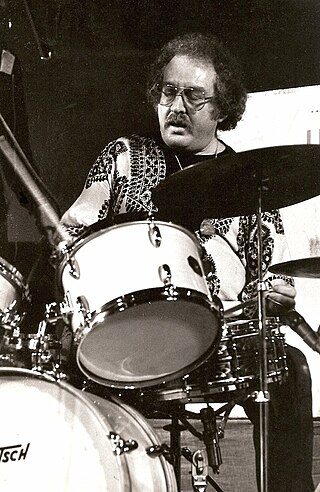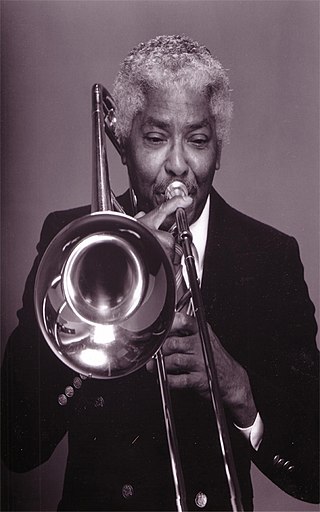Related Research Articles
Jerome Richardson was an American jazz musician and woodwind player. He played the soprano saxophone, alto saxophone, tenor saxophone, baritone saxophone, bass saxophone, soprano clarinet, alto clarinet, bass clarinet, piccolo, western concert flute, soprano flute, alto flute, tenor flute, and bass flute. He played with Charles Mingus, Lionel Hampton, Billy Eckstine, The Thad Jones/Mel Lewis Orchestra, Kenny Burrell, and later with Earl Hines' small band.

Frank Wellington Wess was an American jazz saxophonist and flutist. In addition to his extensive solo work, Wess is remembered for his time in Count Basie's band from the early 1950s into the 1960s. Critic Scott Yanow described him as one of the premier proteges of Lester Young, and a leading jazz flutist of his era—using the latter instrument to bring new colors to Basie's music.

Melbourne Robert Cranshaw was an American jazz bassist. His career spanned the heyday of Blue Note Records to his later involvement with the Musicians Union. He is perhaps best known for his long association with Sonny Rollins. Cranshaw performed in Rollins's working band on and off for over five decades, starting with a live appearance at the 1959 Playboy jazz festival in Chicago and on record with the 1962 album The Bridge.

Arthur S. Taylor Jr. was an American jazz drummer, who "helped define the sound of modern jazz drumming".

Albert "Tootie" Heath is an American jazz hard bop drummer, the brother of tenor saxophonist Jimmy Heath and the double-bassist Percy Heath.

Raymundo "Ray" Barretto Pagán was an American percussionist and bandleader of Puerto Rican descent. Throughout his career as a percussionist, he played a wide variety of Latin music styles, as well as Latin jazz. His first hit, "El Watusi", was recorded by his Charanga Moderna in 1962, becoming the most successful pachanga song in the United States. In the late 1960s, Barretto became one of the leading exponents of boogaloo and what would later be known as salsa. Nonetheless, many of Barretto's recordings would remain rooted in more traditional genres such as son cubano. A master of the descarga, Barretto was a long-time member of the Fania All-Stars. His success continued into the 1970s with songs such as "Cocinando" and "Indestructible". His last album for Fania Records, Soy dichoso, was released in 1990. He then formed the New World Spirit jazz ensemble and continued to tour and record until his death in 2006.

Melvin Sokoloff, known professionally as Mel Lewis, was an American jazz drummer, session musician, professor, and author. He received fourteen Grammy Award nominations.
Quentin "Butter" Jackson was an American jazz trombonist.
Joseph Dwight Newman was an American jazz trumpeter, composer, and educator, best known as a musician who worked with Count Basie during two periods.
Julius Watkins was an American jazz musician who played French horn. Described by AllMusic as "virtually the father of the jazz French horn", Watkins won the Down Beat critics poll in 1960 and 1961 for Miscellaneous Instrument.
James "Osie" Johnson was a jazz drummer, arranger and singer.

George Duvivier was an American jazz double-bassist.

James Milton Cleveland was an American jazz trombonist born in Wartrace, Tennessee.
Seldon Powell was an American soul jazz, swing, and R&B tenor saxophonist and flautist born in Lawrenceville, Virginia.
Samuel David Bailey is an American jazz drummer.
Daniel Bernard Bank was an American jazz saxophonist, clarinetist, and flautist. He is credited on some releases as Danny Banks.
Rudy Collins was an American jazz drummer born in New York City.
Åke Persson was a Swedish bebop jazz trombonist.
This is a Herbie Mann discography. Mann spent his early years recording for a number of jazz oriented record labels, and signed with Atlantic Records in 1961. He recorded with them through the 1960s and 1970s, including their subsidiary Cotillion Records, where he ran his own imprint, Embryo Records, in the 1970s, for his records as well as other musicians. Mann also ran two independent record labels, Herbie Mann Music in the 1980s, and during the 1990s, Kokopelli Records. Minor reissues are not noted.
References
- 1 2 3 Doc Rock. "The Dead Rock Stars Club 2013 January to June". Thedeadrockstarsclub.com. Retrieved June 17, 2013.
- ↑ "Ben Tucker - Credits". AllMusic. December 13, 1931. Retrieved June 17, 2013.
- ↑ "The Dave Bailey Quintet - 2 Feet In The Gutter". JAZZDISCO.org. Retrieved October 9, 2013.
- ↑ "The Marietta Daily Journal - Georgia jazz musician killed in car crash". Mdjonline.com. Retrieved June 17, 2013.
- ↑ "Chicago - Chicago : News : Politics : Things To Do : Sports". Chicago Sun-Times.